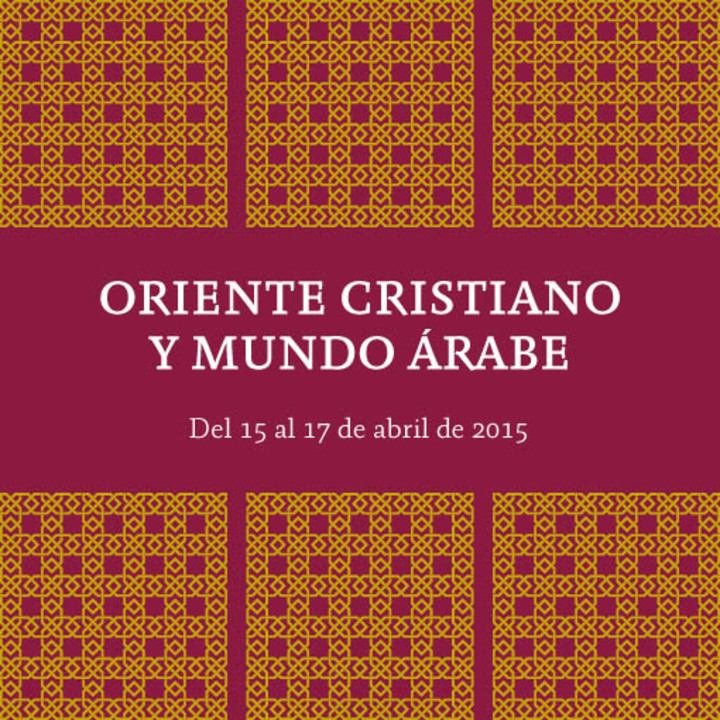Courses and seminars
Index / Activities / Courses and seminars / The Christian East and the Arab world
The Christian East and the Arab world
From April 15, 2015 until April 17, 2015From 10:00 a.m. on Wednesday, April 15 to 1:00 p.m. on Friday, April 17.
MADRID
Casa Árabe Auditorium (at Calle Alcalá, 62)
From 10:00 a.m. on Wednesday, April 15 to 1:00 p.m. on Friday, April 17.
Free entry after registering.
In order to attend, you must register in advance by sending an e-mail
message with the subject line: Oriente cristiano y mundo árabe to this
e-mail address: confirmaciones@casaarabe.es You will not be required to
attend all of the sessions.
Registration is now open for this international seminar on the past, present and future of Arab Christian communities.
The Third Arab Christian Literature Days, which have been organized by Casa Árabe and the Universidad Eclesiástica San Dámaso from April 15-17, 2015, with the title The Christian East and Arab World, are an attempt to perform reflection upon Arab Christian communities. They will focus on these communities’ past, present and future, and on their importance in today’s world. The geographic area dealt with is Egypt, Lebanon, Syria, Iraq and Palestine.
This historical approach will make it possible to become familiar with the roots of Christian communities and appreciate how their present is related to their past. Located in widespread areas throughout the Mediterranean region since they first came into existence, these communities were strongly unified during the first four centuries after Christ, when the Arab identity had not yet been forged. In the fifth century, the split took place in the East which would give rise to the birth of the different communities. Syriac Christianity, rooted in what are known today as Turkey, Syria and Iraq, divided into two currents: monophysitist and Nestorian. In Egypt, the Copts underwent a change in identity towards monophysitism, whereas the Christians who settled in Lebanon preserved their own tradition in isolation. Palestinian Christians, on the other hand, were less affected by this split.
Islam encountered a diversified Christianity that was unified by Arabization and lived under its roof with the status of proteges, or dhimmis. This diversity never ceased to exist and, coupled with differing historical and social circumstances, makes up the identity of Christian communities still today.
They are presently undergoing a process of transition, in which certain postulates are being debated that may be projected outwards and help determine the region’s development: secularization, the concept of citizenship and individual rights, and pluralism. As already occurred in the past, with its theology and literature, the Arab Christian world’s contribution may help enrich the future of Arab countries.
This historical approach will make it possible to become familiar with the roots of Christian communities and appreciate how their present is related to their past. Located in widespread areas throughout the Mediterranean region since they first came into existence, these communities were strongly unified during the first four centuries after Christ, when the Arab identity had not yet been forged. In the fifth century, the split took place in the East which would give rise to the birth of the different communities. Syriac Christianity, rooted in what are known today as Turkey, Syria and Iraq, divided into two currents: monophysitist and Nestorian. In Egypt, the Copts underwent a change in identity towards monophysitism, whereas the Christians who settled in Lebanon preserved their own tradition in isolation. Palestinian Christians, on the other hand, were less affected by this split.
Islam encountered a diversified Christianity that was unified by Arabization and lived under its roof with the status of proteges, or dhimmis. This diversity never ceased to exist and, coupled with differing historical and social circumstances, makes up the identity of Christian communities still today.
They are presently undergoing a process of transition, in which certain postulates are being debated that may be projected outwards and help determine the region’s development: secularization, the concept of citizenship and individual rights, and pluralism. As already occurred in the past, with its theology and literature, the Arab Christian world’s contribution may help enrich the future of Arab countries.
Built in 2011 by the Congregation for Catholic Education, UESD represents a commitment by the Archdiocese of Madrid to higher education which stimulates dialogue between faith and culture. Integrated into the European Space for Higher Education, it awards official degrees in Theology, Canonical Law, Philosophy, Christian and Classical Literature, and Religious Sciences. Its students come from 46 countries in Africa, Asia, Europe and the Americas.

